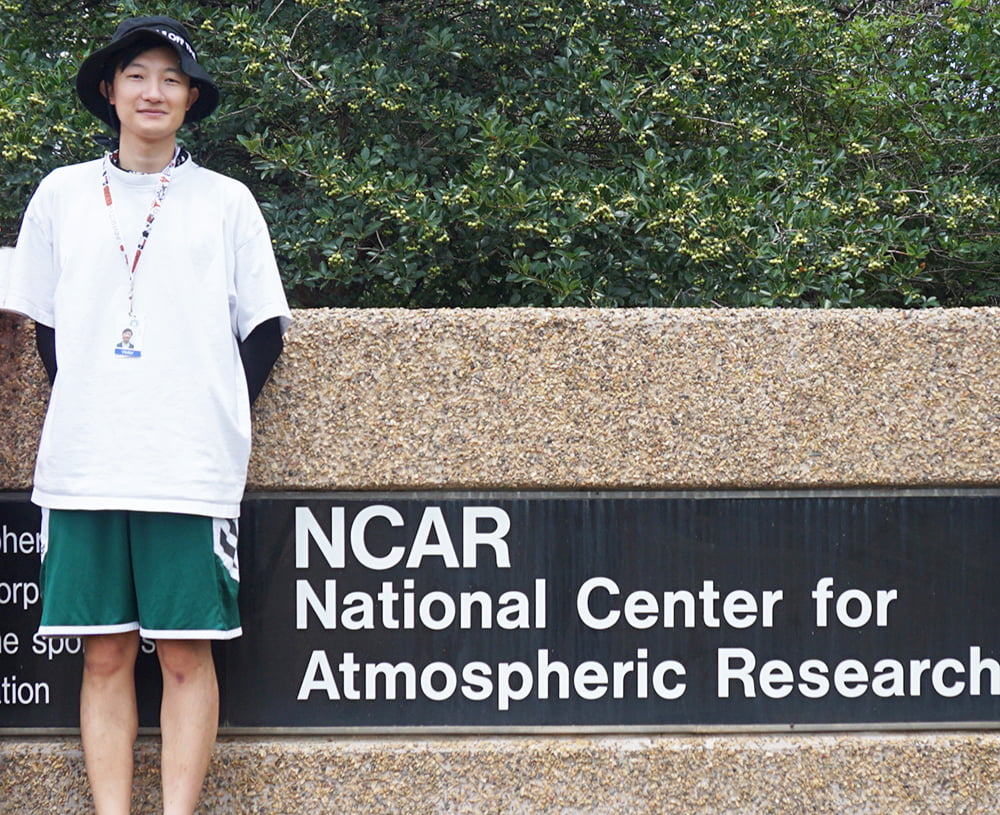Life Sciences Building, Room 206
501 S. Nedderman Drive
Box 19047
Arlington, TX 76019
Physics doctoral student earns award for space weather research

A doctoral student in physics at The University of Texas at Arlington received a top award at an international conference for his research about the effects of a solar eclipse on space weather.
Yu Hong earned an Outstanding Student Presentation Award at the American Geophysics Union (AGU) 2023 Meeting in San Francisco in December. More than 25,000 participated in the competition, with only two percent of students receiving the OSPA distinction.
“I was surprised and excited to win, since this was my first time participating the AGU OSPA competition,” Hong said. “I've seen a lot of outstanding posters in the gallery and I knew it would be very competitive.”
Hong’s project was titled “Inter-Hemispheric Asymmetry (IHA) in the Magnetosphere-Ionosphere-Thermosphere System Due to the December 04, 2021 Solar Eclipse: MHD-GCM Coupled Simulations”. Its focus was on exploring the different responses of the northern and southern hemispheres — known as “inter-hemispheric asymmetry” — during the solar eclipse which occurred in Antarctica on December 4, 2021.
Hong’s co-authors include his faculty supervisor, Yue Deng, UTA professor of physics, as well as collaborators from the University of Michigan, the National Center for Atmospheric Research, the University of Colorado Boulder, and the University of Newcastle in Australia.
“We aim to better integrate the modeling between the ionosphere and the magnetosphere, bridging two fields that have traditionally operated independently,” Hong said. “Using realistic ionospheric conductance will help us to understand the eclipse effect from Earth’s upper atmosphere to the magnetosphere.”
As stated in the project abstract, solar eclipses provide scientists with unique opportunities to investigate the geospace environment. Geospace is the region of space near Earth and includes the upper atmosphere, ionosphere and magnetosphere. The impact on Earth’s ionosphere-thermosphere (IT) system due to rapidly changing solar radiation is well understood, but the effects of eclipses on magnetosphere-ionosphere (MI) coupling dynamics by altering the conductivity has not been fully studied.
Through their research, Hong and his co-authors sought to help quantify the significance of inter-hemispheric asymmetries in the global IT system and their effects on the MI system to provide new insights into the magnetosphere-ionosphere-thermosphere coupling process under extraordinary solar conditions.
During the April 8 total solar eclipse which was visible in the D-FW Metroplex, Hong was on the UTA campus working with students visiting from the University of Michigan. They used numerical models to predict the solar corona, which is the outermost part of the Sun's atmosphere and normally cannot be seen by the naked eye. The corona is visible during the short period of totality during a solar eclipse. The students used modeling tools from UM’s Space Weather Modeling Framework to study the whole Sun-to-Earth system.
The AGU award isn’t the first time Hong’s research has been honored. In 2022 he won first place in the poster competition at the international 2022 CEDAR (Coupling, Energetics and Dynamics of Atmospheric Regions) Workshop. That same summer he was chosen for the highly selective Graduate Visitor Program at the National Center for Atmospheric Research (NCAR). Using radar and satellite data as well as the global ionosphere-thermosphere model (GITM) and the NCAR 3D-electrodynamo model, he studied low-latitude electrodynamics and the hemispherically asymmetric storm-time responses in the upper atmosphere. In addition, he was one of the 2020 recipients of the Outstanding Graduate Presentation Award from the Texas Section of the American Physical Society (APS).
--
The UTA College of Science, a Carnegie R1 research institution, is preparing the next generation of leaders in science through innovative education and hands-on research and offers programs in Biology, Chemistry & Biochemistry, Data Science, Earth & Environmental Sciences, Health Professions, Mathematics, Physics and Psychology. To support educational and research efforts visit the giving page, or if you're a prospective student interested in beginning your #MaverickScience journey visit our future students page.